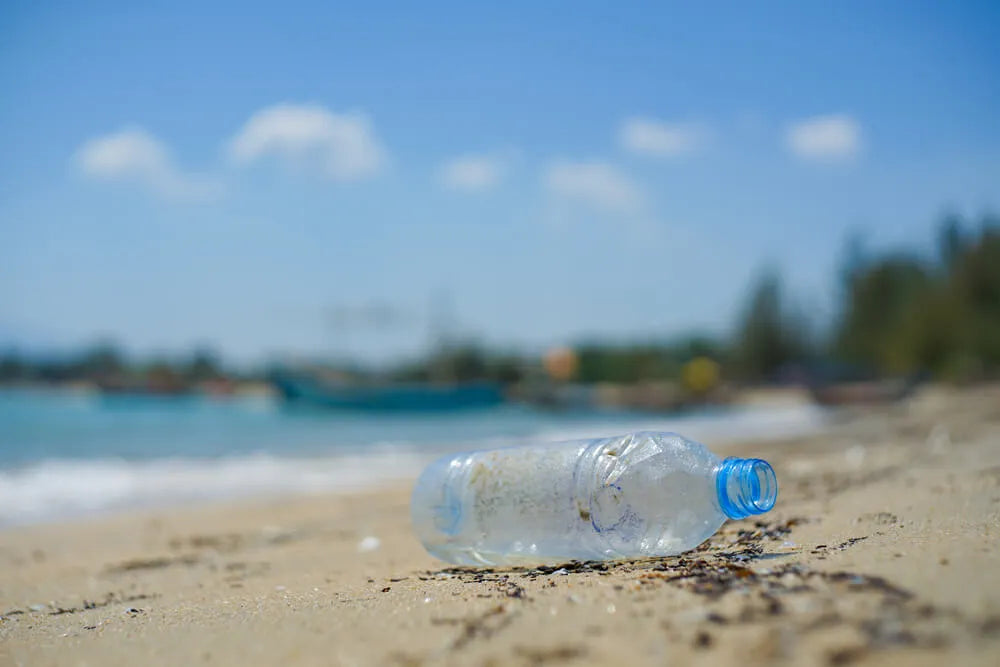We're currently undergoing a litter epidemic. How bad is our single-use plastic problem and what can we do to fight 'lockdown litter' in the UK?
For many families, the coronavirus pandemic has pressed the pause button on all spring and summer travel plans. That fortnight soaking up the sun in the Canary Islands? Forget it. Seeing the historic sights of Europe on a long weekend? No-go.
As a result, we're now looking closer to home to satisfy our wanderlust, exploring the natural beauty and wonders contained within the British Isles.
But there's also a downside to this - a new litter epidemic. Whilst many people have been flocking to our beautiful beaches and popular public spaces, they have not been leaving without a plastic trace. As well as being unsightly, discarded rubbish results in a spike in plastic entering our seas, posing a mortal danger to marine and aquatic life.
According to a recent report by Defra and Keep Britain Tidy, the most littered item in the UK is the small plastic bottle ”accounting for 25% of all our litter.
So, what's the relationship between travel and single-use plastic pollution? How can we do our part to fight lockdown litter?
The single-use scourge: The travel industry is a big-time plastic polluter
Our planet pays a very heavy price for our love of travel. Many popular tourist destinations simply don't have the recycling infrastructure in place to cope with the level of plastic waste that we consume on holiday.
According to a WWF report, the 200 million people who flock to coastal resorts every summer contribute a 40 percent spike in plastic pollution going into the sea.
It's been reported that 150,000-500,000 tonnes of macroplastics enter our oceans every year - enough to fill 66,000 rubbish trucks and bear in mind that each piece takes hundreds of years to decompose. The health risks of this to marine life are well understood; sea creatures can suffocate and choke on large pieces of plastic, mistaking them for food.
Microplastics, the less visible but no less ubiquitous or dangerous polluter, number approximately 70,000-130,000 tonnes per year, to the deleterious effect of aquatic life. These tiny, microscopic fragments enter the food chain, threatening not only animal but even human health. Microplastics can get everywhere, even found in tap water samples in European countries.
According to the UN, if the travel industry went about its business˜ as usual, by 2050 we would have a 251 percent increase in solid waste disposal and a 131 percent increase in greenhouse gas emissions.
We have a big plastic problem on our hands. The good news is that it is possible to clean up and protect the sea from plastics. But this requires the commitment and collaboration of all: governments, businesses and individuals.
With global air travel falling significantly due to coronavirus and the ensuing lockdown, foreign tourist destinations and their nearby seas are getting some much-needed respite.
The solution, therefore, must be a more sustainable way of traveling and enjoying the world's many stunning tourism hotspots. Individuals, businesses and governments all have a big role to play in quashing single-use plastic pollution.
The scourge of UK lockdown litter
With the fall in foreign tourism in 2020, many of us in the UK are exploring our own national travel treasures public spaces, beaches and heritage areas. Unfortunately, it appears that the rubbish we usually export overseas is instead being dumped on our doorstep.
The result? A pandemic of lockdown litter.
Our behaviour has also been transformed by lockdown. With restaurants off the menu for much of the year, socialising has been moved into open areas with the exploding popularity of eating outdoors - the 'picnic effect'.
Many of us will have seen media reports exposing mounds of discarded rubbish - soft drink and water bottles, disposable barbecues, food wrappers polluting our shores and countryside. Sadly, with bins overflowing, litter is surging.
Coronavirus restrictions have also impacted collection and sorting of recyclables in many countries. According to a report on plastic recycling, we're currently at a crossroads - will we regress, or resurge? At the present time, the plastic recycling industry could go in either direction.
How to fight lockdown litter: What can I do?
How can we protect our beloved public spaces, oceans and beaches from plastic?
According to environmental psychologist Lee Chambers, the prevalence of litter is a result of an 'overarching culture of disposability'. Individuals, therefore, have a role to play in fighting the litter pandemic by cutting down on single-use disposables.
Here are four simple ways we can still enjoy everything our treasured landscapes have to offer, whilst reducing lockdown litter:
- Say 'see ya, single-use plastic' - Did you know that the most littered item is the small plastic bottle for non-alcoholic drinks? It accounts for around 25 percent of all our litter! So, start with eliminated single-use water and fizzy drink bottles; one helpful thing to remember is that bottled water companies don't create water, they create plastic. A simple change: invest in a portable reusable water bottle for when you're travelling out and about.
- A fantastic five - this one's perfect for the little ones. It's a great way of involving them in fighting lockdown litter whilst teaching them the importance of global citizenship. When you make a visit to a tourist spot, pack a litter bag. As part of your mission, pick up five pieces of litter that you see. You could even make a fun arrangement with your children - 20 pence for each piece of litter collected, perhaps? Who can collect the most?
- Explore local hidden gems - instead of guzzling fuel on a miles-long journey to a busy, bustling beach, why not seek out those lesser-known local attractions? With fewer people congregating on the same site, bins aren't full or overflowing.
- Pick up after yourselves - it needn't really be said, but it's classic, age-old advice for a reason - and it'll really make a difference. The aim: to leave no trace. If no-one left unwanted items behind, there wouldn't be any litter!
On your travels? Say 'see ya, single-use plastic'!
75 percent of litter is the result of drinks consumption in the UK - so look here as a matter of priority for reducing single-use plastic pollution.
The stylish Doulton® TASTE bottle allows you to have great tasting, healthy filtered water wherever your holidays and trips take you - giving you the undeniable convenience of bottled water whilst eliminating single-use plastic. Do your part, whilst looking the part.
What are your top tips for keeping lockdown litter to a minimum? Let us know on Facebook, Instagram or Twitter!






